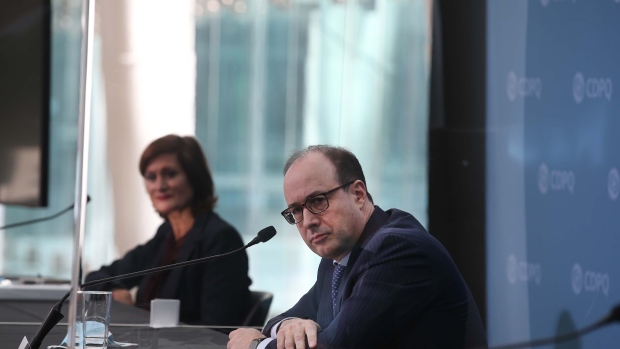Feb 23, 2023
Canada’s CDPQ is slammed by bond rout in worst year since 2008
, Bloomberg News

The historic bond market rout did not spare the Caisse de Depot et Placement du Quebec, causing the pension manager to post its worst results since the global financial crisis.
Canada’s second-largest public fund lost 5.6 per cent and saw net assets fall to $402 billion (US$297 billion), down $18 billion from the prior year. Its fixed-income portfolio was shredded by the rapid rise in interest rates, falling almost 15 per cent.
The result would have been much worse if not for CDPQ’s holdings of industrial property, infrastructure and private equity, all of which saw gains. If the firm held a traditional portfolio of 60 per cent stocks and 40 per cent bonds, assets would have plunged to $367 billion, Chief Executive Officer Charles Emond said at a news conference.
CDPQ’s total return was its worst since 2008, but it outperformed a mixed benchmark that was down 8.3 per cent, the firm said in a statement.
Real estate and infrastructure investments were two of the brightest spots, with the Caisse posting low double-digit gains in each. “Our strategy now focuses on more logistics and more residential, and fewer shopping centers and offices,” Emond said.
Public stocks were down 11.3 per cent — outperforming the S&P 500 — while private equity was up 2.8 per cent. CDPQ did not benefit from the surge in energy stocks as it exited from oil production in 2021. The fund reduced its exposure to the technology sector and increased its holdings in more defensive segments such as insurance, pharmaceuticals and telecommunications.
AZURE POWER
After writing off a US$150 million investment in bankrupt cryptocurrency lender Celsius Network LLC last summer, the Caisse stumbled with its majority stake in India’s Azure Power Global Ltd. The renewable-energy firm has lost two-thirds of its value since the end of August, when the new CEO stepped down and the company disclosed a whistleblower complaint about possible “manipulation of project data and information by certain employees.”
Rating agencies have downgraded Azure’s debt and the company still hasn’t filed an annual report for the fiscal year that ended last March. The Caisse holds a 56 per cent interest in the company.
“There are ongoing investigations. On the aspect of the situation itself, as soon as the Caisse was informed, Azure did everything it had to do,” Emond said.
“For us, we will not compromise on the governance or ethics of this company. The next steps will be the conclusions of the investigation. The story is not over. It is too early to talk about losses. Looking to the future, all the options are on the table.”

